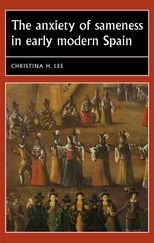The Anxiety of Sameness In Early Modern Spain
The Anxiety of Sameness In Early Modern Spain
Cite
Abstract
This book explores the Spanish elite’s fixation on social and racial “passing” and “passers” as represented in a wide range of texts produced in the sixteenth and seventeenth centuries. It examines literary and non-literary works that express the dominant Spaniards’ anxiety that socially mobile New Christians could impersonate and pass as versions of themselves. Current scholarship has implicitly postulated that the social energy that led to the massive marginalization of New Christians and/or lowborns from central social spaces, and the marginals’ attempts to hide their true identity, had its roots in the elite’s rejection of sociocultural and genealogical heterogeneity, or “difference.” Christina Lee makes a key intervention in this discussion by proposing that there was a parallel phenomenon at play that might have been as resounding as an anxiety roused by the presence of those who were clearly different, a phenomenon she calls “the anxiety of sameness.” Lee argues that while conspicuous religious and socio-cultural difference was certainly perturbing and unsettling, in some ways, it was not as threatening to the dominant Spanish identity as the potential discovery of the arbitrariness that separated them from the undesirables of society. Students and seasoned scholars of Spanish history and literature will not only benefit from Lee’s arguments about the elite’s attempt to deny the fluidity of early modern identity, but also gain from her fresh readings of the works of Cervantes, Lope de Vega, and Quevedo, as well as her analyses of lesser known works, such as joke books, treatises, genealogical catalogues, and documentary accounts.
-
Front Matter
- Introduction
-
I The usurpation of nobility and low-born passers
-
II Conversos and the threat of sameness
-
III Moriscos and the reassurance of difference
-
End Matter
Sign in
Personal account
- Sign in with email/username & password
- Get email alerts
- Save searches
- Purchase content
- Activate your purchase/trial code
Institutional access
-
Sign in through your institution
- Sign in with a library card Sign in with username/password Recommend to your librarian
Institutional account management
Sign in as administratorPurchase
Our books are available by subscription or purchase to libraries and institutions.
Purchasing information| Month: | Total Views: |
|---|---|
| November 2022 | 4 |
| December 2022 | 2 |
| April 2023 | 2 |
| April 2023 | 3 |
| April 2023 | 3 |
| May 2023 | 2 |
| May 2023 | 2 |
| May 2023 | 2 |
| May 2023 | 2 |
| May 2023 | 1 |
| August 2023 | 1 |
| September 2023 | 2 |
| September 2023 | 2 |
| September 2023 | 2 |
| September 2023 | 2 |
| October 2023 | 1 |
| November 2023 | 2 |
| November 2023 | 2 |
| November 2023 | 4 |
| November 2023 | 2 |
| November 2023 | 3 |
| January 2024 | 3 |
| January 2024 | 1 |
| January 2024 | 1 |
| February 2024 | 13 |
| February 2024 | 1 |
| March 2024 | 1 |
| March 2024 | 2 |
| March 2024 | 1 |



Get help with access
Institutional access
Access to content on Oxford Academic is often provided through institutional subscriptions and purchases. If you are a member of an institution with an active account, you may be able to access content in one of the following ways:
IP based access
Typically, access is provided across an institutional network to a range of IP addresses. This authentication occurs automatically, and it is not possible to sign out of an IP authenticated account.
Sign in through your institution
Choose this option to get remote access when outside your institution. Shibboleth/Open Athens technology is used to provide single sign-on between your institution’s website and Oxford Academic.
If your institution is not listed or you cannot sign in to your institution’s website, please contact your librarian or administrator.
Sign in with a library card
Enter your library card number to sign in. If you cannot sign in, please contact your librarian.
Society Members
Society member access to a journal is achieved in one of the following ways:
Sign in through society site
Many societies offer single sign-on between the society website and Oxford Academic. If you see ‘Sign in through society site’ in the sign in pane within a journal:
If you do not have a society account or have forgotten your username or password, please contact your society.
Sign in using a personal account
Some societies use Oxford Academic personal accounts to provide access to their members. See below.
Personal account
A personal account can be used to get email alerts, save searches, purchase content, and activate subscriptions.
Some societies use Oxford Academic personal accounts to provide access to their members.
Viewing your signed in accounts
Click the account icon in the top right to:
Signed in but can't access content
Oxford Academic is home to a wide variety of products. The institutional subscription may not cover the content that you are trying to access. If you believe you should have access to that content, please contact your librarian.
Institutional account management
For librarians and administrators, your personal account also provides access to institutional account management. Here you will find options to view and activate subscriptions, manage institutional settings and access options, access usage statistics, and more.